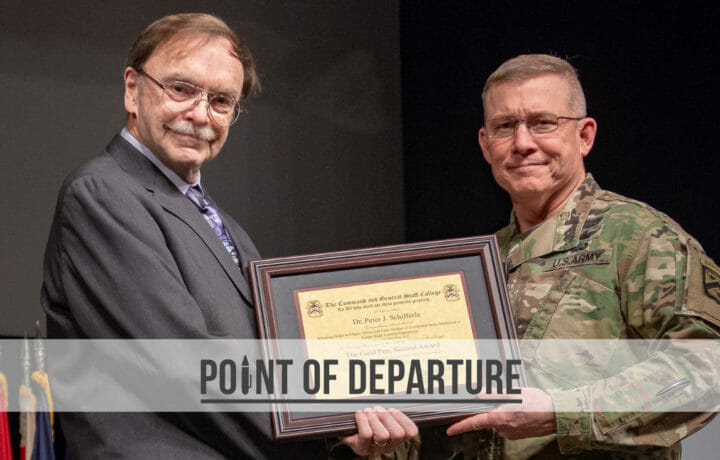“The goal isn’t to live forever; the goal is to create something that will.” – Chuck Palahniuk
The news hit like a sucker punch. I reeled from the suddenness of it, the unexpected blow I never saw coming. The pain was immediate, the sense of loss palpable. Pete Schifferle, a longtime friend and mentor, someone both admired and emulated, was gone. He’d departed, like all good cavalrymen before him, to Fiddler’s Green, the mythical afterlife that offers “perpetual mirth, a fiddle that never stops playing, and dancer’s that never tire.”
His departure stung just a bit more than usual. He’d only recently retired after decades of service to our nation, first in uniform, then later as a civilian faculty member in the Army’s School of Advanced Military Studies (SAMS). I’d missed his retirement ceremony, allowing work conflicts to get in the way of what was sure to be a legendary afterparty. I just assumed that we’d be able to catch up at a later date. I was wrong.
THE VON SCHIFFERLE APPROACH
I first encountered Pete Schifferle during our introductory briefing in SAMS. As students, our encounters with Pete were the living embodiment of something Colin Powell once said: “Avoid having your ego so close to your position that when your position falls, your ego goes with it.” That initial encounter was impactful enough that I felt compelled to weave it into the narrative that wrapped its way around our class yearbook.
It was brutal. It was merciless. It was exactly what we needed to hear. It was what would later term, the “Von Schifferle approach.”
I captured our introduction to then-Lieutenant Colonel Schifferle in a short piece titled, “Peter Schifferle, Everybody’s All-American.” On that first day, he didn’t laud us with terms such as “Jedi Knight” or “intellectual.” He didn’t waste time telling us that we were special. Instead, he challenged us to be the best versions of ourselves possible, to rise to the standard of those who’d come before us. We had to earn the right to bear the burdens we would eventually carry; our selections meant nothing if we weren’t up to the task before us. He did so, however, in his typically blunt, irascible manner. And some among us that day were offended.
He returned the following morning to offer an apology. Or so we thought. Instead, he chastised us for being too sensitive. The responsibilities that we would assume one day weren’t for the faint of heart or the easily offended. If our egos couldn’t withstand being wire brushed with the raw truth, then none of us would last long as division and corps planners. As apologies go, it felt a lot like having your back scratched with a rusty cheese grater. Pete Schifferle didn’t suffer fools well.
Twenty years later, speaking before a group of SAMS students – at the invitation of my friend, Pete – I told the assembled students the story. Pete was a little older, moved a little more slowly, but had lost none of the fire in his soul. “If you hadn’t experienced the Von Schifferle approach,” I told them, “you’ve missed something truly special.” For most students who passed through the halls of the school in the past 25 years, it was a defining experience, one you carried with you for the years that followed.
LEADER, TEACHER, MENTOR
In the years that followed my time in SAMS, I never lost touch with Pete. The lessons he ingrained in us during “the second-best year” of our lives proved invaluable as we moved into a wartime footing following the terrorist attacks of 9/11, and again when the time came to capture those experiences in doctrine. We broke bread, we shared ideas, and we debated such meaningful topics as the contemporary uselessness of the writings of Antoine-Henri Jomini.
When his book, America’s School for War, published in 2010, I wasted no time in not just reading it, but reviewing it. It was a work of genius, impeccably researched and captivatingly written. Pete, long known for digging around his office and querying someone with, “Have you read this?” finally had a book of his own. I keep my copy on my desk at work, signed by Pete years ago. Now, whenever someone wanders into my office and ponders the books on the shelf, I hold up Pete’s and ask them, “Have you read this?”
In his last note to me, just over a month ago, he mentioned that he considered many of us – his students – as his leaders, teachers, and mentors. The opposite had always been true. His legacy, the one that burns so brightly in the hearts of so many, is his role as a leader, teacher, and mentor in our lives. And, after nearly 50 years to leading, teaching, and mentoring, the legacy of Pete Schifferle will endure for generations. And Pete, well, he’s probably in Stetson and spurs in Fiddler’s Green, asking someone, “Have you read this?”
Halfway down the trail to Hell,
In a shady meadow green
Are the souls of all dead troopers camped,
Near a good old-time canteen.
And this eternal resting place
Is known as Fiddler’s Green.




